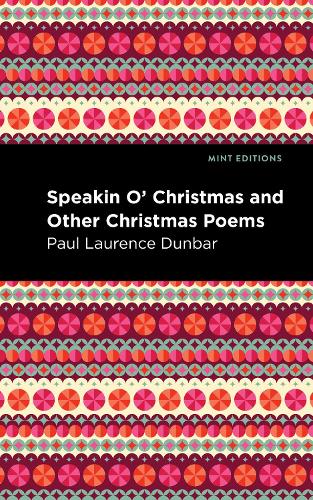
Speakin O' Christmas and Other Christmas Poems
(Paperback)
Available Formats
Publishing Details
Speakin O' Christmas and Other Christmas Poems
By (Author) Paul Laurence Dunbar
Contributions by Mint Editions
Mint Editions
Mint Editions
19th February 2025
United States
Classifications
Physical Properties
Paperback
74
Width 127mm, Height 203mm
Description
Breezes blowin middlin brisk, / Snowflakes thro the air a-whisk, / Fallin kind o soft an light, /Not enough to make things white, / But jest sorter siftin down / So s to cover up the brown /Of the dark worlds rugged ways / N make things look like holidays. /Not smoothed over, but jest specked, / Sorter strainin fur effect, / An not quite a-gittin through / What it started in to do. / Mercy sakes! It does seem queer / Christmas day is most nigh here. / Somehow it dont seem to me /Christmas like it used to be, / Christmas with its ice an snow, / Christmas of the long ago.
Once praised by Frederick Douglass as the most promising young colored man in America, Paul Laurence Dunbar was an exceptionally gifted poet who helped lay the foundation of African American literature and was the first African American poet to achieve major success across the color line. Published posthumously nearly ten years after his untimely death, Speakin O Christmas and Other Christmas Poems, collects over a dozen of his most festive, holiday-themed verses into a single volume, including, Chrismus is A-Comin, Soliloquy of a Turkey, Christmas in the Heart, and the titular, Speakin O Christmas.
Celebrating both the spirit of the holiday season and the talent of the Negro dialect poet, Paul Laurence Dunbar, Speakin O Christmas and Other Poems is a delightful collection of poetry for readers of all ages.
Author Bio
Paul Laurence Dunbar (1872-1906) was an African American poet, novelist, and playwright. Born in Dayton, Ohio, Dunbar was the son of parents who were emancipated from slavery in Kentucky during the American Civil War. He began writing stories and poems as a young boy, eventually publishing some in a local newspaper at the age of sixteen. In 1890, Dunbar worked as a writer and editor for The Tattler, Dayton's first weekly newspaper for African Americans, which was a joint project undertaken with the help of Dunbar's friends Wilbur and Orville Wright. The following year, after completing school, he struggled to make ends meet with a job as an elevator operator and envisioned for himself a career as a professional writer. In 1893, he published Oak and Ivy, a debut collection of poetry blending traditional verse and poems written in dialect. In 1896, a positive review of his collection Majors and Minors from noted critic William Dean Howells established Dunbar's reputation as a rising star in American literature. Over the next decade, Dunbar wrote ten more books of poetry, four collections of short stories, four novels, a musical, and a play. In his brief career, Dunbar became a respected advocate for civil rights, participating in meetings and helping to found the American Negro Academy. His lyrics for In Dahomey (1903) formed the centerpiece to the first musical written and performed by African Americans on Broadway, and many of his essays and poems appeared in the nation's leading publications, including Harper's Weekly and the Saturday Evening Post. Diagnosed with tuberculosis in 1900, however, Dunbar's health steadily declined in his final years, leading to his death at the age of thirty-three while at the height of his career.
